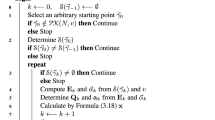Abstract
The problem of a priori estimation of the result of a mulicriteria two-person competitive game is considered in the framework of operations research. Various aspects of decision making in such games are discussed. Relations between the values of a vector best guaranteed result (BGR) for both players are obtained. The difference of the mulicriteria antagonistic game considered as a model of taking into account the natural uncertainty from the mulicriteria zero-sum game considered as interaction with a purposeful opponent is formalized. Special attention is paid to the concepts of the value and solution of the latter game. As the basic solution of this game, we use the multicriteria Shapley equilibrium when it gives to each player the result not worse than her or his BGR. It is shown that the last condition is not restrictive. The definition of the one-sided value of the multicriteria game as the player’s BGR if her BGR is independent of the order of the players' moves and the definition of the corresponding one-sided solution are given. It is proved that the equilibrium is weaker than the one-sided solution, and the equilibrium always exists in mixed strategies. The existence of a one-sided solution in mixed strategies is guaranteed by a special interpretation of multicriteria averaging. To justify the conclusions, Slater’s value of the multicriteria optimum is parameterized using Germeier’s scalarizing function.





Similar content being viewed by others
REFERENCES
Yu. B. Germeier, Introduction to the Theory of Operations Research (Nauka, Moscow, 1971) [in Russian].
A. V. Lotov, V. A. Bushenkov, G. K. Kamenev, and O. L. Chernykh, Computer and the Search for Compromise: The Feasible Goals Method (Nauka, Moscow, 1997) [in Russian].
V. V. Morozov, A. G. Sukharev, and V. V. Fedorov, Operations Research Problem Book (Vysshaya Shkola, Moscow, 1986).
N. M. Novikova, I. I. Pospelova, and A. I. Zenyukov, “Method of convolution in multicriteria problems with uncertainty,” J. Comput. Syst. Sci. Int. 56, 774–795 (2017).
N. M. Novikova and I. I. Pospelova, “Mixed strategies in vector optimization and Germeier’s convolution,” J. Comput. Syst. Sci. Int. 58, 601–615 (2019).
M. M. Smirnov, “On the logical scalarization of criteria in the problem of approximation of the Pareto set,” Zh. Vyschisl. Mat. Mat. Phys. 36 (3), 62–74 (1996).
L. S. Shapley, “Equilibrium points in games with vector payoffs,” Naval Res. Logistics Quart. 6 (1), 57–61 (1959).
V. I. Podinovskii and V. D. Noghin, Pareto-Optimal Solutions of Multicriteria Problems (Nauka, Moscow, 1982) [in Russian].
D. Blackwell, “An analog of the minimax theorem for vector payoffs,” Pac. J. Math. 6, 1–9 (1956).
G. Jentzsch, “Some thoughts on the theory of cooperative games,” in Advances in Game Theory, Ann. Math. Studies. (Princeton Univ. Press, 1964), vol. 52, pp. 407–442.
V. V. Morozov, “Mixed strategies in a game with vector payoffs,” Vestn. Mosk. Univ., Ser. 15, Vychisl. Mat. Kibern., No. 4, 44–49 (1978).
R. J. Aumann and B. Peleg, “Von Neumann–Morgenstern solutions to cooperative game without sidepayments,” Bull. Amer. Math. Soc. 66, 173–179 (1960).
E. M. Kreines, N. M. Novikova, and I. I. Pospelova, “Multicriteria two-person games with opposite interests,” Comput. Math. Math. Phys. 42, 1430–1444 (2002).
Yu. A. Komarov and A. B. Kurzhanskii, “On minimax problems with a vector criterion,” Proc. of the Int. Conference devoted to the 95th Anniversary of N. N. Krassovskii “Stability, Control, and Differential Games”(SCDG2019),Ekaterinburg, 2019 (Inst. Mat. Mech., Ural’skoe Otd. Ross. Akad. Nauk, Ekaterinburg, 2019), pp. 180–184.
V. I. Zhukovskii and M. E. Salukvadze, Optimization of Guarantees in Multicriteria Control Problems (Metsnierba, Tbilisi, 1996) [in Russian].
I. I. Pospelova, “Classification of vector optimization problems with uncertain factors,” Comput. Math. Math. Phys. 40, 820–836 (2000).
V. D. Noghin, “Duality in multicriteria programming,” Zh. Vychisl. Mat. Mat. Fiz. 17 (1), 254–258 (1977).
N. M. Novikova and I. I. Pospelova, “Multicriterial decision making under uncertainty,” Math. Progam. 92, Ser. B, 537–554 (2002).
H. Moulin, Game Theory for the Social Sciences (Studies in Game Theory and Mathematical Economics) (New York Univ. Press, New York, 1986).
N. M. Novikova, I. I. Pospelova, and A. S. Semovskaya, “Multistage vector minimax,” Comput. Math. Math. Phys. 40, 1391–1403 (2000).
N. M. Novikova, I. I. Pospelova, and E. M. Kreines, “Existence conditions of game solution in multicriteria case,” Abstracts of 18th Int. Symp. on Mathematical Programming (ISMP2003) DTU, 2003, Copenhagen, Denmark.
Yu. B. Germeier, Non-Antagonistic Games (Nauka, Moscow, 1976; Reidel, Dordrecht, 1986).
N. M. Novikova and I. I. Pospelova, “Scalarization method in multicriteria games,” Comput. Math. Math. Phys. 58, 180–189 (2018).
M. Voorneveld, D. Vermeulen, and P. Borm, “Axiomatizations of Pareto equilibria in multicriteria games,” Games Econ. Behavior 28, 146–154 (1999).
V. V. Podinovski, Ideas and Methods in the Theory of Criteria Importance in Multicriteria Decision Making (Nauka, Moscow, 2019) [in Russian].
A. H. Hamel and A. Lohne, “A set optimization approach to zero-sum matrix games with multi-dimensional payoffs,” Math. Meth. Oper. Res. 88, 369–397 (2018).
S. A. Eroshov, “On two-person perfect information games and vector payoff function,” in Applied Mathematics and Software (Mosk. Gos. Univ., Moscow, 1979), pp. 99–105.
ACKNOWLEDGMENTS
We are grateful to V. V. Morozov for a useful discussion of the preliminary version of this paper.
Author information
Authors and Affiliations
Corresponding author
Additional information
Translated by A. Klimontovich
Rights and permissions
About this article
Cite this article
Kreines, E.M., Novikova, N.M. & Pospelova, I.I. Multicriteria Competitive Games as Models in Operations Research. Comput. Math. and Math. Phys. 60, 1570–1587 (2020). https://doi.org/10.1134/S0965542520090122
Received:
Revised:
Accepted:
Published:
Issue Date:
DOI: https://doi.org/10.1134/S0965542520090122




